- Harmful ways to dispose of oils & fats
- What are fatbergs?
- How to dispose of cooking oils & fats (the right way!)
Between roast dinners and fried food, we can be left with a lot of excess oil and fat to dispose of. Before you pour it down the sink, you need to think twice!
Oil and fats that are incorrectly disposed of down sinks and drains end up causing huge problems in sewers, creating fatbergs. Today we're sharing some simple ways that you can dispose of oils responsibly.
Harmful ways to dispose of oils & fats
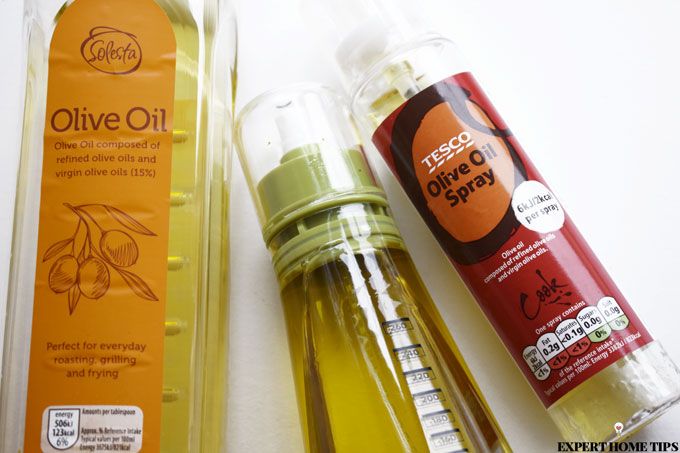
There are three things you should never do with cooking oils and fats:
- Rinse them down the sink
- Flush them down the toilet
- Put them in the rubbish bin
You might think that a small amount of oil rinsed down the sink won't do any harm, but it all adds up. Oil and water don't combine, meaning that the oils and fats gather together, producing fatbergs.
Pouring oils and fats directly into your rubbish bin can result in oils spilling out when bags rip. This can attract vermin and potentially be harmful to the environment. For this reason, it's important that we take great care to place oil and fat in sealed containers when we dispose of it.
Do you know if you should flush hair down the toilet? Read our other article to find out!
What are fatbergs?
Fatbergs are large clumps of fat, baby wipes and sanitary items that block sewers and drainage systems. The fat mainly originates from cooking fat and oil which has been put down drains - it can cause chaos!
The oil and fat in drains mix with wet wipes, nappies and other sanitary items that have been wrongly flushed down toilets. The mass solidifies, blocking the system. As sewage can no longer pass through the system, you can end up with flooding and sewage leaks. These leaks destroy homes and damage wildlife.
How to dispose of cooking oils & fats (the right way!)
1. Use a paper towel
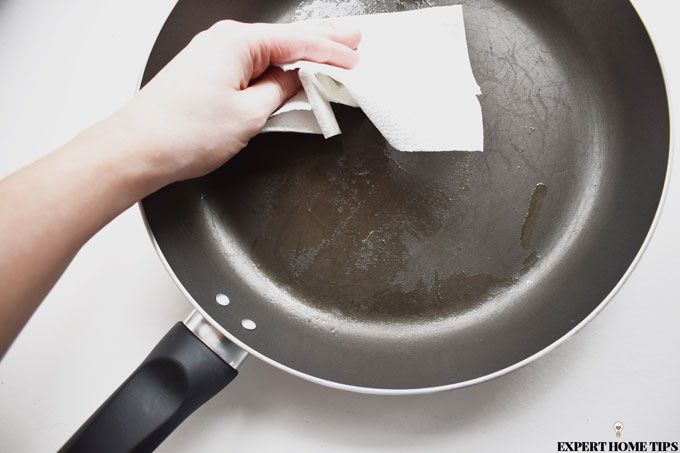
If there is just a small amount of fat left on your pans and trays, don't rinse it off in the sink - take a piece of kitchen roll and wipe it off. Dispose of the kitchen roll in your general waste bin and wash up your pans as normal.
On the subject of pans, why not clean your burnt pans with the tips in our other article:?
TOP TIP: If you're in the middle of cooking a dish that looks a little oily, dab the fat off with a piece of kitchen roll.
2. Feed the birds
Used oil and fats don't have to be destined for the bin. Combine suet, lard or other solid fats with a birdseed mix to make bird feeder balls. Leave the mix to cool and solidify. Hang the ball out in your garden and watch the wildlife roll in!
TOP TIP: Put the mixture into half a coconut shell for a sturdy mould.
3. Check with your council
Some councils will gladly collect cooking oil to dispose of correctly. Some will even use it to make fuel!
4. How to reuse fat
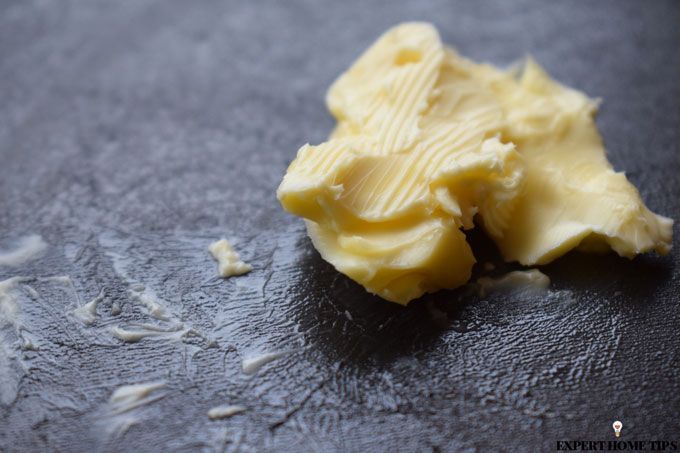
If you like getting your money's worth, you can actually reuse some fats! All you need to do is filter the used fat through a coffee filter to remove any pieces of food and then pop it into a container. Put the container in the fridge and leave overnight. When it has cooled, you'll find a jelly on top. Remove this before use.
Never reuse oils, as these can break down and release free radicals.
5. Freeze it
Looking for a long-term option? Your freezer will come in handy. Take a spare ice cube tray and fill each cube up with your used, filtered oil or lard. You can reuse it whenever you need to without having to worry about it going bad.
6. Bin it
We may use kitchen roll to mop up and dispose of small amounts of oil, but what about larger quantities? It's easy! Take a non-recyclable container and pour excess oil and fats into it. Seal it well and dispose of it in the general waste bin. If you don't have a non-recyclable container, you can use a jar or a bottle.
7. How to reuse cooking oil
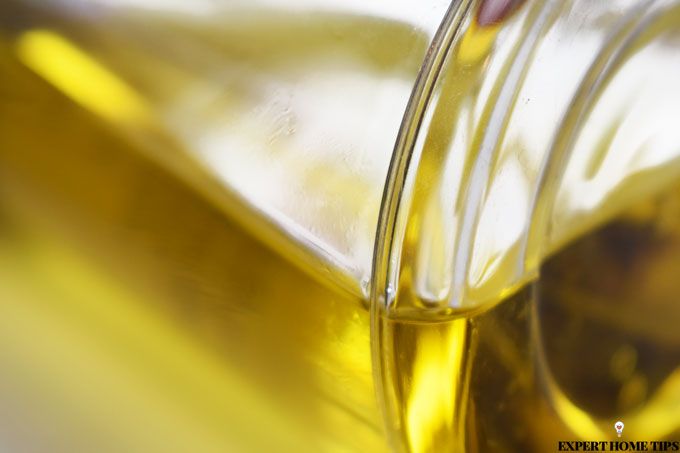
Reusing oil is even easier! If you've cooked using oil, and need to cook something else afterwards, just use that same oil again. If you intend to store the oil for future use, you may wish to filter it first.
Think about what you're reusing the oil with and whether it's appropriate. You don't want to reuse oil that's been used to cook meat in a vegetarian dish or baked goods.
Next up, let's fix your bathroom blockages by finding out how to get rid of hair from drains.
Do you know of any other ways to dispose of oil and fat? Let us know in the comments below!
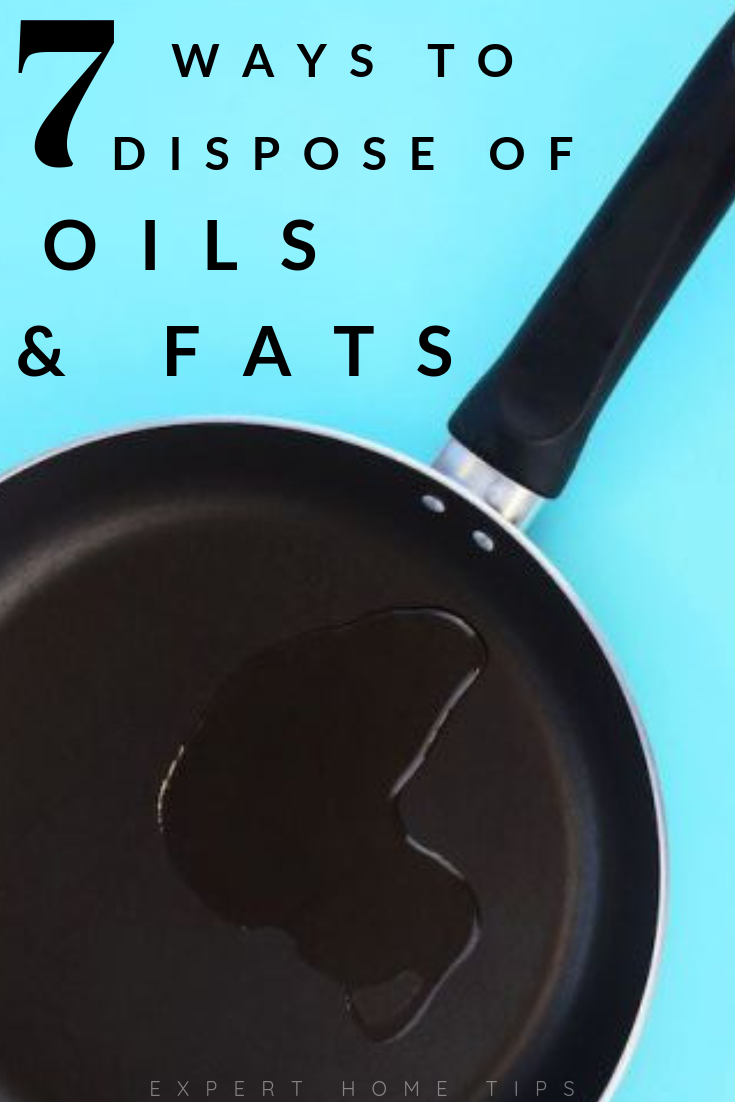
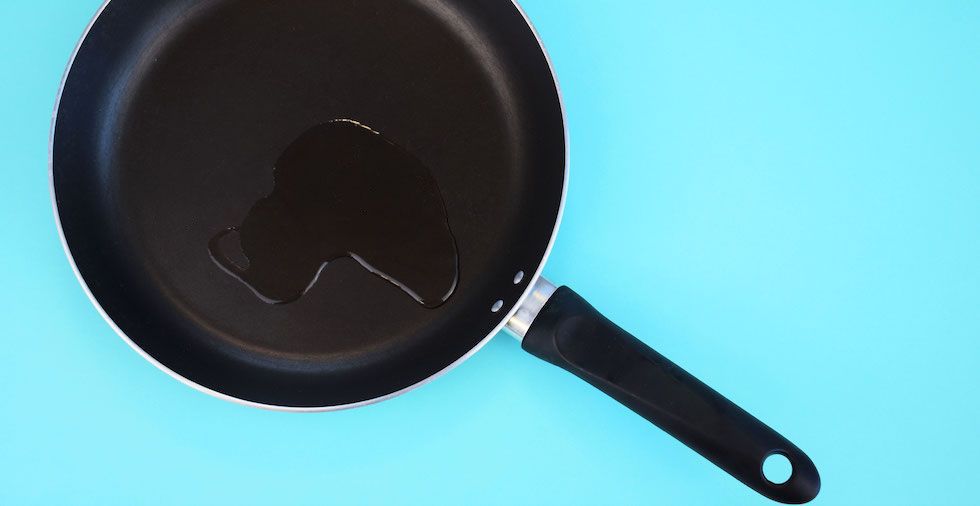
Heat the oil or fat and place a slice or two into the pan to soak it up. Fry the bread until crispy and serve with any fried or grilled breakfast foods. It's delicious with a fried egg on top and doesn't take long to make.
Great idea, Terence!
I thought there was a maximum number of times due to acrylamide that you can re-use oil and fat. This is all old news and inadequate infirnation- even filtering does not prevent build up of carcinogens in re-used oil. Better perhaps to use your site for raising awareness and a petition to councils to collect at roadside with other recyclables.
Hi there! If you have a deep fat fryer, it's completely safe to reuse oil. It would be brilliant if all councils were able to collect it.
We only eat fried food about once a month, beer battered fish a chips is the big treat. To save money and the environment I reuse cooking oil in my deepfat fryer no more than 3 time, I always strain between uses and store in the fridge but I worry about free radicals in reheated oil that breaks down proteins in our cells and DNA potentially causing cancer.
Hi Janice! If you're worried about the risks of reusing oil, it's probably best for you to follow another one of the methods for discarding it.
Some excellent ideas and very topical at the moment. We like to have home made chips made with Rapseed oil. I always keep the plastic bottle and when the oil is no longer suitable and needs changing I pour it back into the bottle and take it to my recycling facility on my next visit.
Good to hear, Susie!
Hi, Thank you for suggestions, I have been trying to find a good way for disposing oil after frying. I love the idea for mixing fat and bird food. One thing is strange, for years we were told that reusing oil is cancerous. I am confused.
We love that tip too, Gordana!
I make cake as a treat for my dog (and friends dogs) using the left over fat and oils. I keep a small dish at the back of the worktop near the stove and filter ALL used fat and oil into it. Once a week I make cake using 2oz of fat, 2oz cheap flour, 2oz of any left-over meat (minced or chopped in the food processor), add an egg and a little cheese, if we have any left, or a spoon of peanut butter, spread the mix on a baking tray. When the oven is hot at the end of a meal I pop it in for about 10mins until nicely browned then cut it into small squares and leave to cool. This mix keeps well in the fridge for up to 2 weeks (although it never lasts that long) I used it initially to train my dog to came when I blew a whistle, and it worked.
That's a fantastic idea, Kathy! I'll have to give this a go with my own dog. I'm sure he'd love it as a treat. Thanks for sharing that with us.
I found out that poor the oil into the garden (on dry plants that you cut in order to burn), is a great way to get rid of the oil you got left, even if you don't have the fire the oil is going back to the ground and will be reused by other plants....
Hi Lilach! That's an interesting idea. My concern with it would be the environmental impact of burning the plants. Used oil can also attract vermin such as rats, so do watch out!
Hi Joanne, When I've roasted a chicken, for instance, I pour the fat from the tin on to saved, used tea bags. They soak it up quickly and can then easily be disposed of in the bin. Also, Lakeland has a couple of fat disposal products for sale. One is an eco-safe powder that turns fat into a solid block. It's called Quickshine Deep-Fat Fixer and costs £3.49 (ref.26122).
Great ideas! Thanks for sharing, Sandy.
It's great living in Milton Keynes. We have a green bin to dispose of 'green' compostable produce to go in the council's 'compost bins' and a grey bin to get rid off everything else that is compostable, which gets ground down and fed into an anaerobic digester - the FOG will produce biogas.
That sounds great, Philip!
I have just read all these comments looking for the answer to a question which has been bugging me for ages - what to do with fat which I can't use - either burnt, or gone off, or just unusable for some reason. If your waste collection authority incinerates general waste, then oil and fat can indeed go into the general bin, it raises the calorific value (CV) of the waste, and that is good for incinerators. The hotter they burn the better, in fact if their waste is too "cold" then fuel has to be burnt to get the temperature up to a safe level, creating more CO2. ("safe" means here "relatively safe" - incineration is always problematic). But if your waste collection authority sends general waste to landfill, then what happens to the oil and fat? As far as I can see once it gets so far down that conditions become anaerobic, (no air) it must biodegrade eventually into methane, which is a grrenhouse gas far worse than CO2. So in thee authorities the oil and fat should definitely not go "into the bin." And then came the last comment, fro m someone who lives in an authority which collects green waste and makes compost with it, and collects bio-waste like oil and fat and sends it to an AD (Anaerobic Digester) plant. If only we could all have access to a collection system like that!
It would be great, Daniel! Sadly we can only do so much as individuals - we need to see greener changes from our local councils.
I'm surprised people would pour significant quantities of oil at all, except when deep frying something (I don't know much about it). Oil burns and therefore can be eaten for energy in the body. If I cook potatoes or add fried meat or sausage to porridge or pasta, all the cooking fat is absorbed by the starchy base food for a nice flavor if it is butter or lard. Salted melted lard with crumbles tastes good on bread. Indeed it does clog up pipes over time. In a house we used burn all food waste in central heating, including oily paper.
Thanks for sharing, Jason!
Lakeland sell a product called Deep fat fixer its brilliant it makes the oil solid so it can be disposed of in the bin. The maker Quickshine.
That sounds great! Is it environmentally friendly?
Hi Joanne, I have a hot compost bin and I scrape my waste fats into that, together with food waste, grass clippings and shredded cardboard, paper...etc. Hot composters are sealed and can therefore be used to compost down animal fats, chicken and fish carcasses, small bones, together with other things more usually associated with composting. Kind regards Gary Walker
Thanks for sharing!
A new coffee filter paper in its cone standing a top a container will clean the oil if you pour it through it.
Great idea! Thanks for sharing.
I have poured my oil into a glass jar (coffee jar) and then when it cools, it turns a mustard colour. Being in a jar, can I re-use it, or would I have to discard it? If I can still re-use it, is it safe to re-heat a glass jar full of fat-oil on a stove or in a microwave? Normally I just discard it in the jar. I've completely filled the jar, put the lid on it and then discard it.
While the cooled oil's changed colour may not make it unsafe to consume, reusing it after heating it multiple times is not recommended. If you choose to reheat the oil in a glass jar, it's important to do so carefully and avoid heating it too quickly or for too long to prevent the jar from breaking or shattering due to thermal shock.
Hi, if you have a cat, pour the oil in the used cat litter, and then dispose of in the rubbish bin,as normal.
That's a good idea!
I used to soak mine up with cat litter until I read about porridge oats. Use them to soak up the oil and then put them out for the birds.
Hi Joanna A , I have a deep fat fryer, but now the family a have flown the nest, I don't use It very often, what I do is melt the fat and strain off any food bits, I then transfer it into A large saucepan and put a large amount of water on it and bring it not quite to the Boil, watching it all the time giving it a stir now and then after 10 min I leave it to cool letting all the bits settle to the bottom of the saucepan and it leaving the fat clean, And when cold I put it in the fridge, once solid I remove the fat removing any thing stuck to the bottom of the fat slab and then I use it to make Fat cake for the birds using wheat germ ( don't ask I order some on line and receive about 5 kg! ) I melt the fat again and add as much as the fat will take of the wheat germ I usually place it in a microwaveable bowl to soften the wheat germ and when cold I break off small amounts and put it on the bird table, because I have cleaned out any bit of chips etc.. It keeps in the fridge for ages. I like the idea of making doggy cake but my dogs are fed wheat and gluten free food (very expensive) I wonder if I could use corn flour? Any ideas?
You could try corn flour as a gluten-free alternative for making a doggy cake. Ensure that any other ingredients you add to the cake are gluten-free and safe for dogs.
Lakeland sell an Absorb Bin (check online/catalogue.)which you buy Liners for. Once full they can go in the general rubbish. Costs a little of course but cleaner and more hygienic that poring into bottles etc.
That sounds great!
I am a bit confused. At the top you say there are three things you should never do with cooking oils and fats: Rinse them down the sink; Flush them down the toilet; Put them in the rubbish bin. Tip 6 advises to Bin it! Both cannot be right.
Hi Ray! You should not pour the fat directly into the bin, but it's safe and advisable to put it into the bin once transferred to a sealed container.
After cooking chicken pour fat into a cup and put in fridge, when you want to make gravy take out the cup, get rid of white fat on top which will be hard and throw in bin, use rest for a stock
Genius!
Instead of mopping up oil in a frying pan with kitchen paper use diced bread and then put it out for the birds - they love it.
Thanks for sharing!
I found this article very useful. Thank you! Just wanted to return the favour by clarifying one thing: Cinderella did all the cleaning. Only a guy would believe that you can just sing and a hundred rodents would leave the safety of their nests to do your job for you. ;-)
We're glad you found it helpful!
I pour used oil and fat into used cream/milk cartons and recycle into the compost bin.
Thanks for sharing! Oil and fat can adversely affect the composting process and the environment. Used oil and grease can be challenging to break down in a compost pile and can attract pests like rodents. Regarding composting, not all materials are suitable for the process, and oil and fats are not ideal. This can lead to an imbalance in the compost pile and make it less effective at breaking down organic materials. Therefore, it's essential to properly dispose of used oil and fat by checking with your local waste management facility for instructions on how to dispose of used oil and fat in your area.
Whenever I roast, fry, or grill meat I always save any oils/fats etc. Then when I clean the chicken carcass for my cats, everything apart from actual bones goes into a large dog dish along with anything my cats have left after their meals. I put the oils and fats in the dish and this then goes outside the back door to feed the stray cat that calls every evening and the fox that lives at the bottom of the garden. I have to admit that I always make sure there is food out every night, even get my daughter to pass on anything she has that the fox might eat. I don't like waste, this is simply my answer to that problem; mind you, I have found that the fox doesn't seem to like peppers, or potatoes.
It's good that you're reducing waste and feeding animals, but be mindful of the type of food you provide and how it's stored and disposed of to avoid health problems and attract other wildlife.
What I do is put old oil in a 4 pint plastic milk bottle. Then when it is full I put it in the freezer and put it out in the rubbish bin. I think this is a good idea so it will not seep out in the refuse lorry.
That's a fantastic idea!
another method to soak up oil (besides porridge oats) is to use flour. If my flour goes out of date I never put it straight in the bin - it soaks up oil so it can be scraped into my green food waste caddy. I put some in the bottom of the caddy too as the liners tend to burst when they get wet.
That's a brilliant idea!